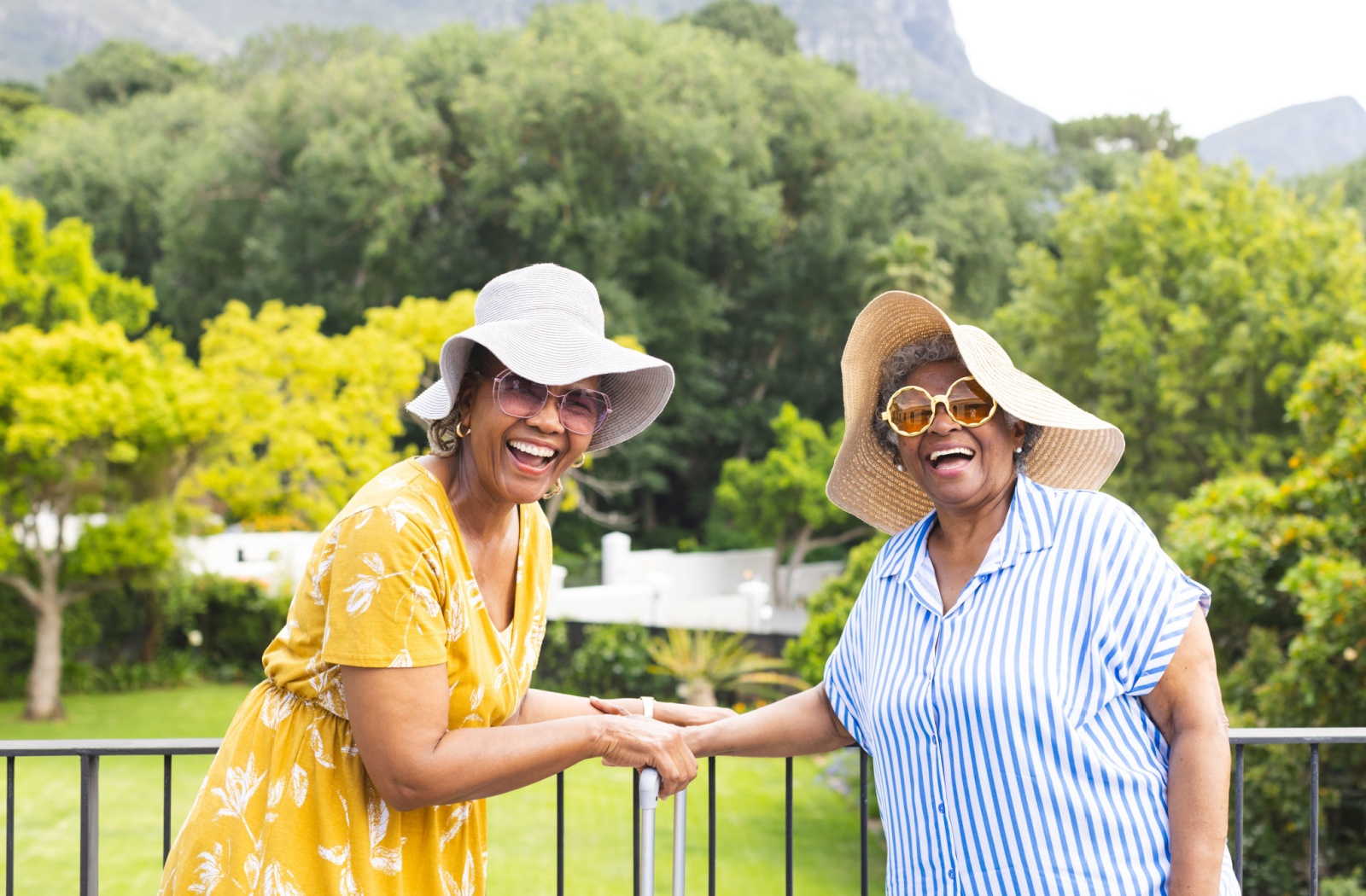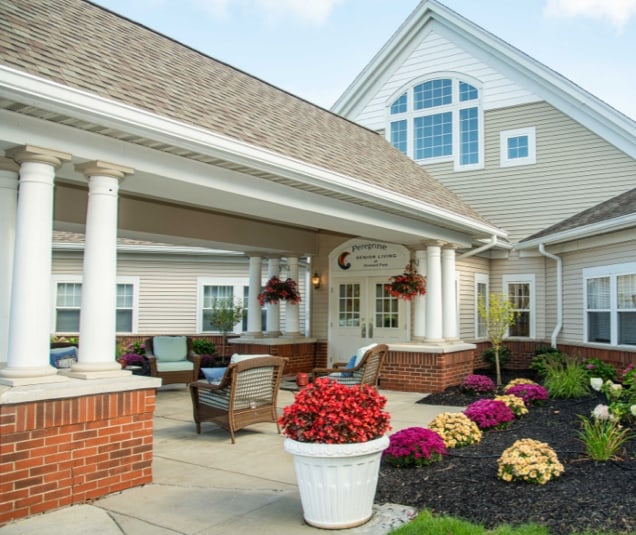Summer is a wonderful time. It’s full of sunshine, longer days, beautiful nature, and all kinds of engaging opportunities and events. However, the warm season also presents new challenges for older adults. That’s why we take proactive steps to keep your loved one safer during summertime and maintain their quality of life.
Our community goes above and beyond through comprehensive safety measures. Residents always have access to our incredible team of caregivers. Whether it’s staying hydrated or enjoying shaded relaxation, we make summers enjoyable and stress-free.
Common Summer Risks Seniors Face
Summer can be tough on the body, particularly for older adults. With higher temperatures and lower humidity, older adults are at a higher risk of heat-related challenges.
Some common summertime problems for seniors include:
- Dehydration due to insufficient fluid intake or excessive heat exposure
- Heat exhaustion and heat stroke caused by prolonged exposure to high temperatures
- Sunburn resulting from unprotected skin under direct sunlight
- Increased risk of falls due to heat-induced fatigue or dizziness
- Complications of existing medical conditions aggravated by extreme heat
This risk increases when other factors are at play. Medications, chronic conditions, or even just personal preferences can worsen the risk of heat-related problems for seniors.
How to Keep Seniors Safe All Summer
To keep an older loved one healthier during the summertime, staying proactive is essential. That’s why we take a well-rounded approach to prevent problems like dehydration and heat stroke from occurring. It helps to follow these steps:
Stay Hydrated at All Times
Staying hydrated is one of the most important steps during summertime. Older adults often feel less thirsty, which increases the risk of dehydration. However, without enough fluids, your loved one’s overall health and well-being could be at risk.
Some simple but effective ways that we help residents beat the summer heat include:
- Encouraging them to drink water regularly, even if they aren’t feeling thirsty.
- Offering water-rich foods like fruits and vegetables, such as cucumber and melon.
- Keeping a water bottle within easy reach throughout the day.
- Setting reminders or using apps to prompt regular hydration.
- Avoiding beverages with caffeine or alcohol, as they can contribute to dehydration.
Wear the Right Clothing
Next, it’s time to look at your loved one’s wardrobe. The proper attire makes a significant difference in summer. That’s why we encourage residents to adjust their clothing to better suit the season.
Wearing light-colored, lightweight, and breathable fabrics helps regulate body temperature and minimize overheating. Meanwhile, accessories matter too—wider hats and sunglasses protect their face and eyes from harmful UV rays.
Time It Right
Timing is everything when it comes to outdoor activities in the summer. Prioritizing the mornings and early evenings, rather than the middle of the day, helps seniors avoid the hottest times.
We also make sure to remind seniors to take regular breaks from the sun. It’s easy to overexert oneself during summer, and regular breaks help prevent heat exhaustion or heat stroke.
Stay in the Shade
Shade provides a welcome retreat from the sun’s intensity. Sometimes, the easiest way to avoid heat-related problems in seniors is to encourage them to step into the shade.
Whether it’s relaxing under a tree, spending time on a patio, or simply sitting in a well-shaded room, being in the shade can bring relief from the scorching temperatures. Alternating sun time with proper shade promotes a healthier season.

Use Indoor Spaces
When outdoor temperatures rise too high, indoor spaces become a refuge. Air-conditioned lounges, libraries, or activity rooms are excellent for unwinding and connecting with others. Staying indoors makes it easier to stay comfortable during hotter hours.
When the sun’s at its highest, seniors should spend time in cooler areas. At Peregrine, we like to encourage indoor activities when it’s too hot—this includes board games in the lounge or art activities with others.
Signs of Heat-Related Problems in Seniors
Even the most proactive approach isn’t perfect. Some common signs of heat-related problems include:
- Excessive sweating or no sweating at all
- Dizziness or confusion
- Weakness or fatigue
- Rapid pulse or breathing
- Nausea or vomiting
- Headache
- Muscle cramps or spasms
Other warnings, such as dizziness, intense fatigue, or confusion, signal more concerning heatstroke. Don’t ignore these signs—they can quickly lead to worse symptoms.
A Safer Summer Is Within Reach!
Supporting your loved one during the warmer months doesn’t need to feel overwhelming. In fact, at Peregrine Senior Living at Orchard Park, we’re happy to help support your loved one this season. We focus on proactive solutions tailored to each resident’s health and well-being.
We’re ready to step in and give your loved one the home they deserve. Schedule a visit with our team today—your loved one’s future home could be waiting!












Happy Valentine’s Day! ❤️
Love takes many forms—between partners, friends, families, and even across generations.
Today we celebrate the love that fills our community: the care shared between residents and team members, the laughter that brightens our halls, and the sense of belonging that reminds us we’re never alone.
May your day be filled with connection, warmth, and heart.
peregrineorchardpark.com/ ... See MoreSee Less
0 CommentsComment on Facebook
Today we were able to celebrate Valentine’s Day a few days early with our annual Valentine’s Day couples luncheon  ... See MoreSee Less
5 CommentsComment on Facebook
February is American Heart Month, a time to focus on caring for the muscle that keeps us moving and thriving. 🫀
We encourage residents to take heart-healthy steps every day: enjoying balanced meals, staying active, connecting socially, and taking moments to rest and recharge.
Together, we can make heart health a daily celebration of life and well-being.
peregrineorchardpark.com/ ... See MoreSee Less
0 CommentsComment on Facebook
It’s a good news minstrel’s kinda of day ... See MoreSee Less
1 CommentsComment on Facebook
Want to stay connected with what’s happening across our community?
Follow us on Instagram for updates, moments we love, and stories worth sharing.
Come join the community by following us via the link below ⬇️
www.instagram.com/peregrineorchardpark/ ... See MoreSee Less
0 CommentsComment on Facebook
On Super Bowl Sunday, it appears that many fans are supporting any team except the Patriots. ... See MoreSee Less
1 CommentsComment on Facebook
This month, we celebrate the incredible achievements, resilience, and cultural richness of Black Americans who have shaped our history and continue to inspire our future.
We believe in honoring every story and embracing the diverse experiences that strengthen our community. May this month remind us all to listen, learn, and uplift—today and always.
peregrineorchardpark.com/ ... See MoreSee Less
0 CommentsComment on Facebook